Key takeaways:
- Village witch beliefs reflect a complex mix of fear, reverence, and cultural heritage, often serving as an alternative source of hope during times of misfortune.
- Historical context reveals that many so-called witches were traditional healers with essential knowledge of herbal remedies, highlighting the fragile nature of societal trust.
- The author’s personal encounter with the witch transformed their understanding, revealing the wisdom and kindness often hidden behind fear and superstition.
- Engaging with local folklore fosters a deeper connection to community identity and the values that shape our lives, reinforcing the importance of tradition in understanding our heritage.
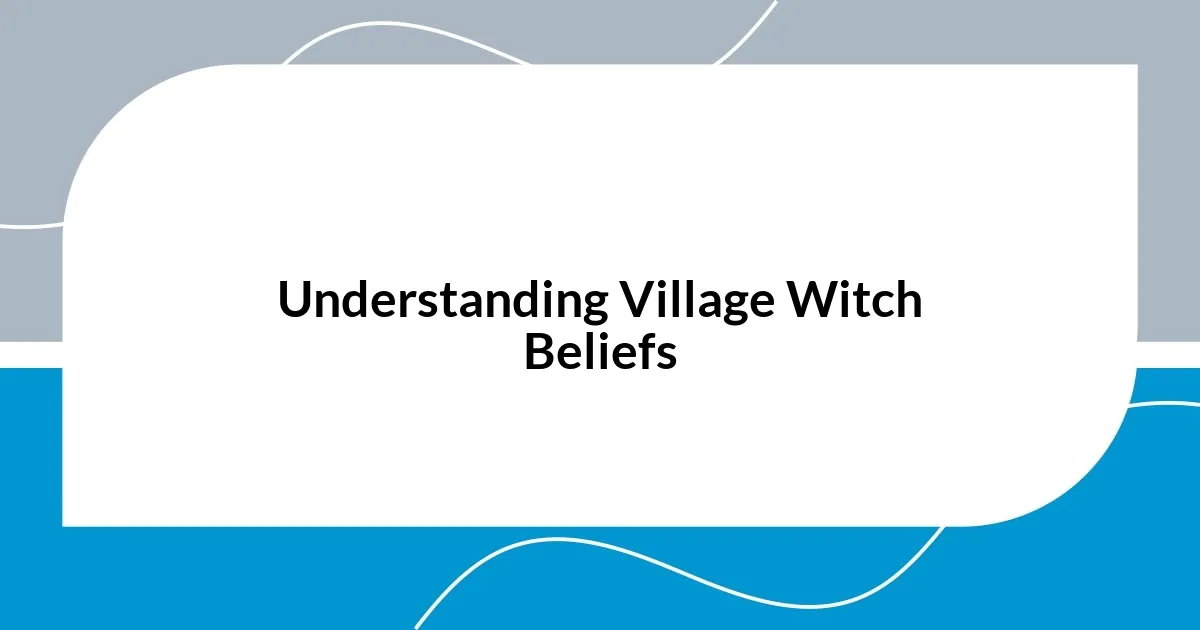
Understanding Village Witch Beliefs
Understanding village witch beliefs often requires diving into the collective psyche of a community. I remember sitting around a fire one evening, listening to elders share stories about a local healer who everyone believed could converse with spirits. Isn’t it fascinating how such stories create a sense of mystery and connection within a village?
These beliefs can shape not only how villagers view the witch but also how they perceive their own lives and challenges. In my experience, when people encountered illness or misfortune, their first thought often turned to seeking help from the witch instead of conventional medicine. Why do you think that is? It’s as if these beliefs offer an alternative source of hope, turning to the intangible when the tangible seems insufficient.
Moreover, I’ve seen how fear and reverence coexist in the perception of witches. On days when the moon was full, whispers would spread about whether the witch had cast her spell—making the air heavy with anticipation and anxiety. Have you ever felt that blend of fear and curiosity? It makes you wonder how such beliefs can mirror our own struggles with the unknown, doesn’t it?
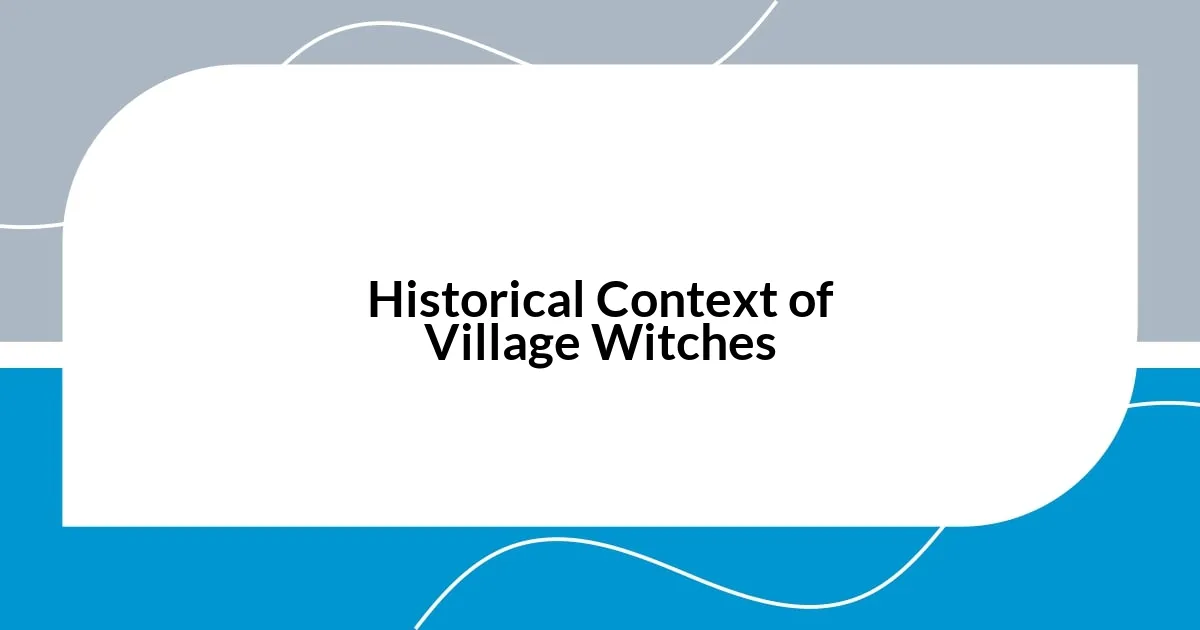
Historical Context of Village Witches
The concept of village witches often reflects a historical tapestry woven with superstition and societal roles. Back in my grandmother’s village, the local witch, who also served as a healer, was perceived as both a protector and a scapegoat. There was a sense of comfort in knowing someone wielded the power to heal, yet the fear of her potential to curse loomed large. Do you remember tales like that from your own childhood? They resonate deeply, don’t they?
Throughout history, many women labeled as witches were simply guardians of traditional knowledge, handing down herbal remedies through generations. I recall a warm summer evening, sitting with my grandmother as she narrated how real witches were often wise women who knew the earth’s secrets—herbs, roots, and the rhythms of nature. They were invaluable to their communities, but in times of uncertainty or hardship, they could just as easily become the target of fear-driven accusations.
The trials and tribulations faced by these so-called witches reveal how societal fears shape folklore. During tough harvests or sickness outbreaks, a village could quickly pivot from gratitude to blame. I often ponder how fragile trust can be. Have you experienced such a shift in your community dynamics? It’s sobering to think how quickly the fear of the unknown can unravel the very fibers of communal ties, transforming a healer into a villain overnight.
| Era | Perception of Witches |
|---|---|
| Medieval Times | Feared as malevolent forces, targeted in witch hunts. |
| Renaissance | Regarded as sources of wisdom, but still at risk of persecution. |
| Modern Era | Often romanticized or trivialized in popular culture. |
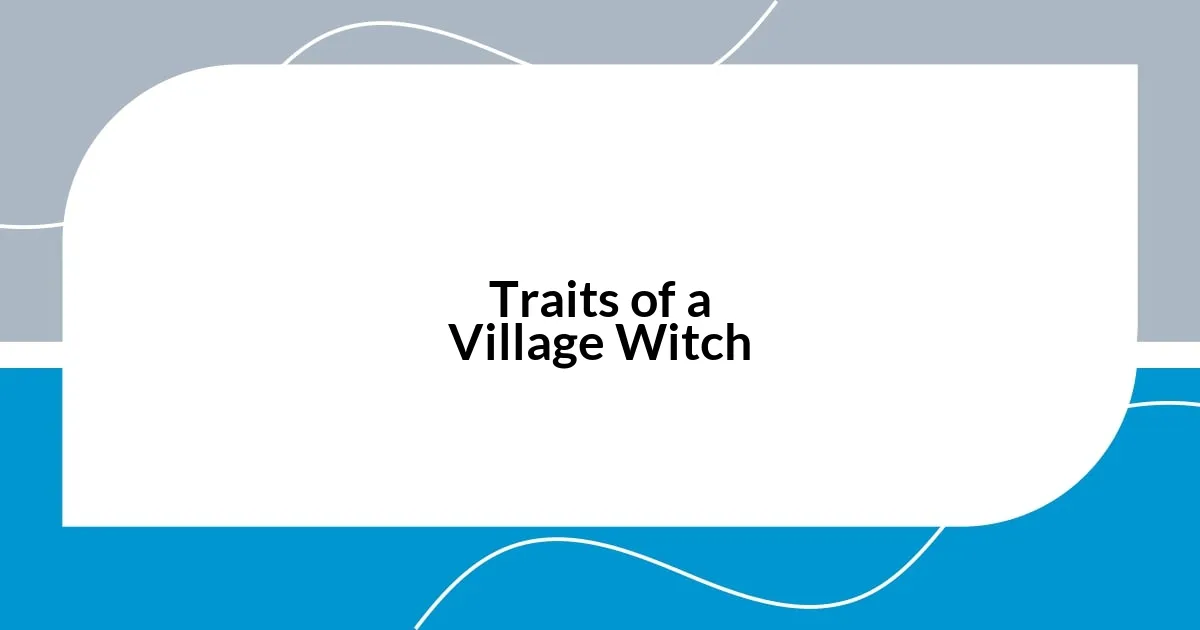
Traits of a Village Witch
I find that the traits of a village witch often blend unique gifts, deep knowledge of nature, and a hint of mystery. From my experience, she is usually seen as a custodian of secrets, someone who possesses both the wisdom of the ages and an uncanny ability to connect with the unseen. I remember a rainy afternoon when an old neighbor taught me about the healing properties of herbs; it was moments like these that made the witch feel more like a protector than a threat.
Here are some notable traits often associated with village witches:
- Herbal Knowledge: Mastery of plants and their medicinal uses.
- Spiritual Connection: A belief in their ability to communicate with spirits or the supernatural.
- Intuitive Insight: An uncanny ability to understand people’s emotions and predict outcomes.
- Community Role: A blend of healer, counselor, and sometimes, a scapegoat for the village’s fears.
- Ritual Practices: The use of rituals or spells that may seem strange to outsiders but hold significant meaning for locals.
What I’ve noticed is that villagers often approach them with a mix of awe and caution, as if aware that the witch’s powers could both heal and harm. I still think back to the time I watched a woman from my neighborhood “read” the patterns in the leaves. It left me in a state of wonder, feeling that there was a world just beneath the surface of everyday life. That sense of awe is what keeps the legend of the village witch alive in our hearts.

My First Encounter Experience
I still vividly remember the day I first laid eyes on the village witch. It was a crisp autumn afternoon, and I was wandering through the forest when I stumbled upon her small, weathered cabin. As I approached, an enchanting smell of dried herbs wafted through the air, wrapping around me like a familiar embrace. Was it curiosity or an unexplainable pull that brought me closer? I can’t say for sure, but the sight of her bent over a wooden table, meticulously grinding something green and fragrant, made my heart race with a blend of fear and fascination.
As our eyes met, she wore a knowing smile that disarmed my apprehension almost instantly. I could see the wisdom etched into her features, each wrinkle a testament to stories whispered through the winds of years past. “What brings you here, young one?” she asked, her voice soft yet commanding, making me feel both small and significant in that moment. I stumbled over my words, torn between the urge to flee and an insatiable desire to stay, to learn. Have you ever felt that delicate dance between fear and wonder? Those feelings collide in a way that leaves you forever changed.
Before I knew it, I was sitting on a rickety stool, enthralled as she shared the secrets of her craft—the healing powers of common plants, the importance of the moon’s phases, and the wisdom of listening to the earth. I’ll never forget the way her hands moved, weaving through the air as if conjuring magic with every gesture. Her words sparked an awakening within me, a realization that maybe the village witch was not just a figure of superstition but a link to a world rich with knowledge and mystery. It made me wonder: how many others would benefit from appreciating such an extraordinary woman if they took the time to truly see her?
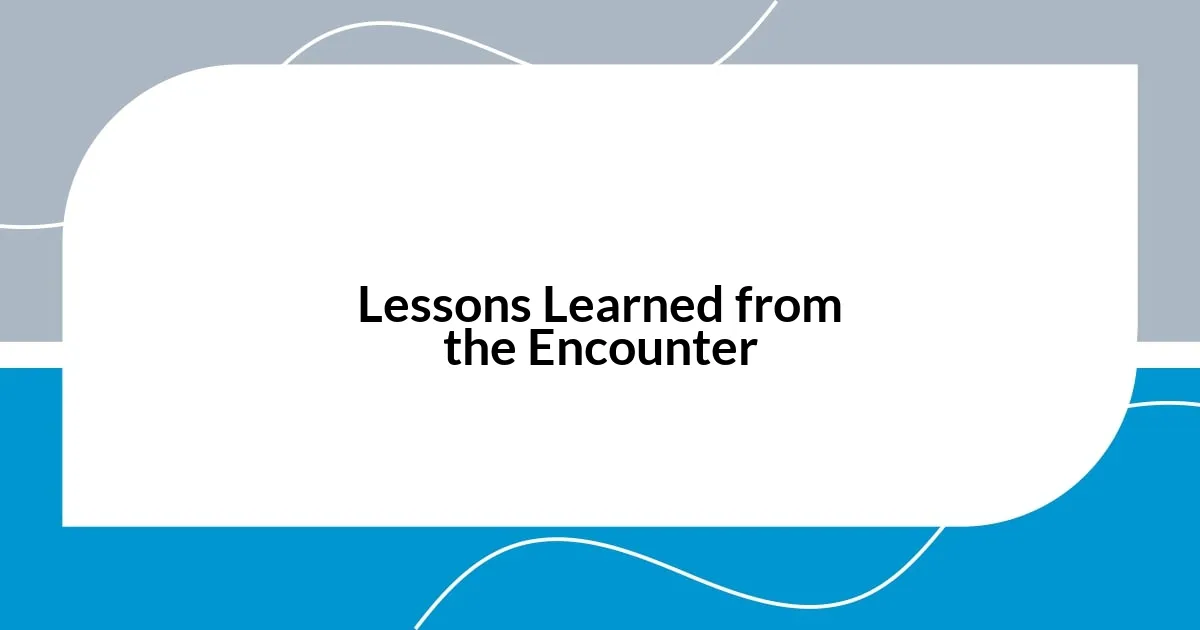
Lessons Learned from the Encounter
Examining the encounter with the village witch, I’ve realized that preconceptions can often cloud our understanding. Initially, I was terrified, thinking she might be sinister. However, as I engaged with her, I discovered a wealth of knowledge and kindness. It struck me that sometimes, what we fear the most can lead us to the most enlightening experiences.
Another lesson that emerged was the importance of respecting nature and its gifts. During our conversation, she urged me to embrace the healing properties of the plants around us. It reminded me of times when I felt overwhelmed by modern life, longing for connection with the earth. Have you ever stopped to appreciate the simple healing power of a walk in the woods or the scent of fresh herbs? I felt compelled to adopt her teachings, soon finding peace in nature’s rhythms.
Lastly, I learned that listening is a powerful tool. The witch emphasized the importance of tuning into our surroundings, suggesting that every rustle and whisper holds a message. After our meeting, I took walks where I consciously listened—without distractions, just absorbing the sounds of nature. It was eye-opening, teaching me that we often miss vital insights simply because we don’t take the time to pause and reflect. Have you ever taken a moment to just listen? It’s a perspective I cherish now.

Impact on My Perspective
The encounter significantly shifted how I view the world around me. Before meeting the witch, I often dismissed things that felt otherworldly as mere fairy tales. But her presence made me realize there’s magic in the mundane, lurking in the corners of our daily lives. Have you ever paused and thought about how the world feels different when you open your eyes to it?
After that day, I felt more interconnected with nature. I remember walking home, the sunlight filtering through the trees and the air thick with earthy scents. It dawned on me that every plant and flower has a story and a purpose. This realization deepened my appreciation for the natural world and its mysteries, leading me to spend more time outdoors, absorbing the wisdom that comes from simply being present.
Moreover, my mindset evolved to embrace curiosity over fear. When I encounter someone who seems different or strange now, I often ask myself: What wisdom might they hold? It’s almost liberating to approach life with a sense of wonder and openness. Instead of rushing to judgment, I now seek to understand and learn—a lesson that has enriched my relationships and experiences profoundly. Have you ever considered how much light can enter your life when you choose curiosity instead of apprehension?
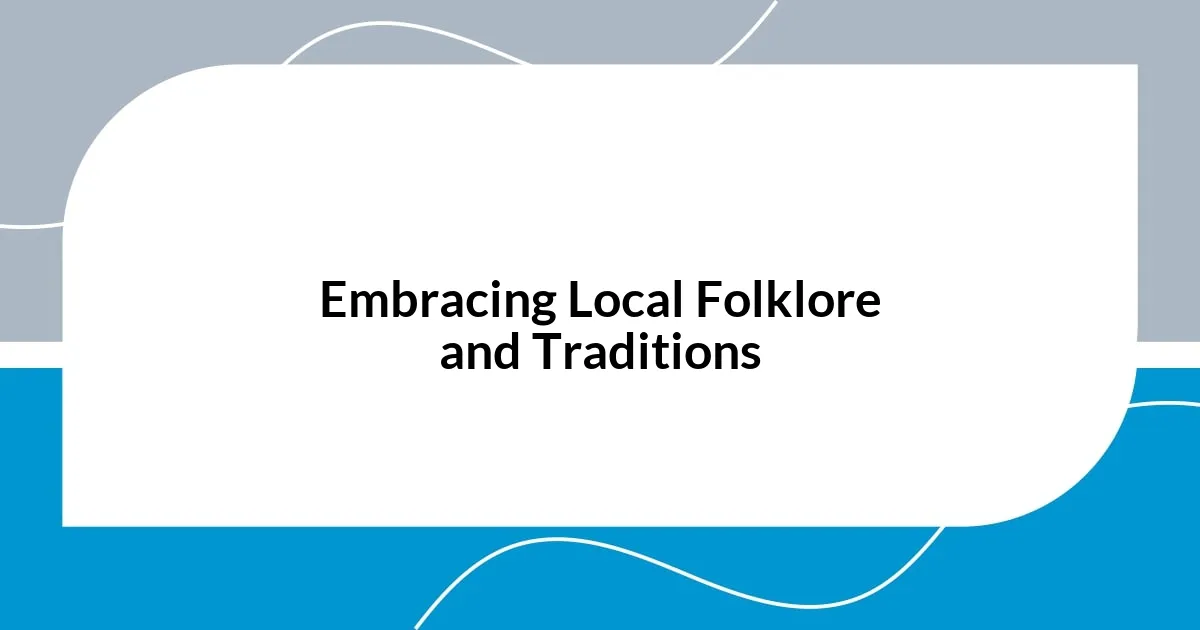
Embracing Local Folklore and Traditions
When I think about embracing local folklore and traditions, I’m reminded of how these stories connect us to our community. I remember my grandmother sharing tales of village spirits during cozy evenings by the fireplace. Those stories not only entertained but also instilled a sense of identity and pride in our heritage. Have you ever felt a spark of connection to your roots through stories?
Engaging with local traditions allows us to appreciate the unique tapestry of our culture. For example, I participated in a village festival honoring the harvest season last year, where elders shared ancient songs and rituals. It was a beautiful reminder of the wisdom passed down through generations. This experience deepened my appreciation for how these traditions shape our communal bonds and collective memory.
Moreover, folklore often reflects timeless lessons and values. I recall overhearing a discussion about a local myth concerning honesty that resonated with me deeply. It made me consider how these narratives guide our behavior and shape our moral compass. In a world that sometimes feels chaotic, have you noticed how stories can ground us, reminding us of the values we cherish? Embracing such folklore enriches not just our understanding but also our way of living.